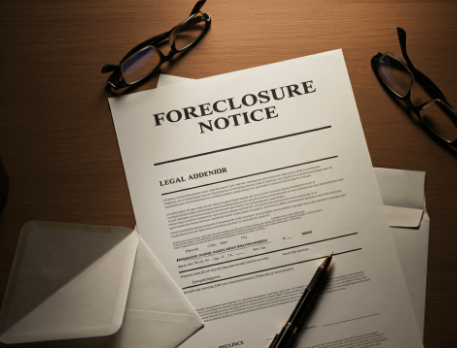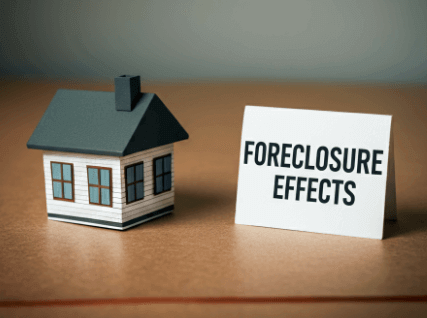Understanding the foreclosure effects in Florida is crucial for homeowners, investors, and community members alike. Foreclosure, the procedure by which a lender seizes a property because the borrower has not met mortgage obligations, can have far-reaching consequences. These can vary from financial strain to a decrease in neighborhood property values. In this blog, we will delve into the foreclosure effects in Florida, providing actionable insights and vital information to help you navigate this challenging scenario.
Real estate investors like Steve Daria and Joleigh have firsthand experience with the foreclosure effects in Florida. They highlight the significance of comprehending market trends and legal aspects to mitigate potential losses. Through their expertise, they provide invaluable guidance to fellow investors navigating the complexities of the foreclosure landscape.
What is Foreclosure?
It pertains to the legal procedure through which a lender endeavors to recoup the remaining loan balance from a borrower who has ceased making payments.
The lender does this by forcing the sale of the asset utilized as the collateral for the loan.

Legal Process
Foreclosures are judicial in Florida, meaning they go through the court system.
This procedure begins when the lender files a lawsuit against the borrower for not meeting the mortgage obligations.
Because it involves the courts, the process includes various legal steps, hearings, and potentially a trial, making it more complex and time-consuming compared to non-judicial foreclosures.
Borrower’s Rights
Borrowers in Florida have the right to contest the foreclosure in court.
This means they can present defenses, such as disputing the amount owed or challenging the lender’s right to foreclose.
Contesting the foreclosure can potentially delay the process and even lead to a resolution that allows the borrower to keep their home or negotiate better terms.
Timeline
The foreclosure process in Florida can take several months to over a year, depending on various factors.
These factors include whether the borrower contests the foreclosure, the court’s schedule, and the complexity of the case.
Additionally, any negotiations or attempts at loan modification between the borrower and lender can extend the timeline further.
Get An Offer Today, Sell In A Matter Of Days
Causes of Foreclosure
Several factors can lead to foreclosure, many of which stem from financial hardships:
Job Loss
Unemployment or significant loss of income can make it hard to keep up with mortgage payments, leading to foreclosure.
Without a steady income, homeowners may struggle to meet their financial obligations, resulting in missed payments and potential legal actions from lenders.
Medical Expenses
High medical bills not covered by insurance can rapidly deplete savings and create difficulties in staying current on mortgage payments.
Unexpected health issues can create a financial burden that forces homeowners to choose between paying for necessary medical care and maintaining their home.
Divorce
Divorce often involves legal fees and the financial impact of living separately, which can strain the financial resources of both parties.
The division of assets and the rise of living expenses can make it difficult for either party to afford mortgage payments, potentially leading to foreclosure.
Unexpected Repairs
Costly home repairs that strain finances can disrupt a homeowner’s budget and ability to pay their mortgage.
When essential repairs, such as fixing a roof or addressing structural issues, become necessary, homeowners may find themselves diverting funds from their mortgage payments to cover these expenses, increasing the risk of foreclosure.
The Foreclosure Process in Florida
The foreclosure process in Florida involves several steps:
Notice of Default
The lender provides a notice of default after missed payments, alerting the borrower to the delinquency and providing a timeframe to rectify the situation.
Filing a Lawsuit
If the borrower does not deal with the default, the lender files a lawsuit.
This initiates the judicial foreclosure process, requiring the borrower to respond to the court summons.
Court Proceedings
Both parties present their case in court.
The borrower can contest the foreclosure, and the lender must prove the default and their right to foreclose.
Judgment
If the court rules in favor of the lender, a judgment of foreclosure is issued.
This ruling empowers the lender to proceed with selling the property.
Auction
The property will be awarded to the bidder submitting the highest bid.
The proceeds from the sale are used to pay off the mortgage debt and any associated costs.

Foreclosure Effects in Florida
The initial foreclosure effects in Florida on homeowners are both emotional and financial:
- Credit Score: A significant decrease in credit score can affect future borrowing. Foreclosure can lower a homeowner’s credit score by 100 to 160 points, making it challenging to obtain new credit or loans.
- Financial Strain: Loss of property and potential legal fees can create a significant financial burden. Homeowners may also face difficulties finding new housing, adding to their financial stress.
- Mental Health: Stress and anxiety related to losing one’s home can take a toll on mental health. The emotional impact of foreclosure can lead to feelings of shame, depression, and anxiety.
Long-term Foreclosure Effects in Florida
The long-term foreclosure effects in Florida can be challenging to overcome:
- Credit Report: Foreclosure stays on your credit profile for up to seven years. During this time, it can be difficult to qualify for new loans or credit.
- Higher Interest Rates: Future loans may come with higher interest rates. Lenders view borrowers with a foreclosure history as higher risk, often resulting in less favorable loan terms.
- Difficulty in Renting: Landlords may be hesitant to rent to a person with a foreclosure history. This can make finding rental housing more challenging and potentially more expensive.
Impact on Property Sellers
For property sellers, foreclosure can complicate the selling process:
- Decreased Property Value: Foreclosed properties often sell for less. This can reduce the overall value of neighboring properties and affect market perceptions.
- Market Perception: Foreclosure can signal financial distress, affecting buyer interest. Buyers may be wary of getting a property that has been through foreclosure due to concerns about its condition or market value.
- Legal Complications: Knowing the legal aspects can be complex and time-consuming. Sellers may need to address liens, unpaid taxes, and other legal issues before the sale can proceed.
Strategies to Avoid Foreclosure
There are several strategies that homeowners can consider to avoid foreclosure:
- Loan Modification: Negotiating new loan terms with the lender can make mortgage payments more affordable. Loan modification includes extending the loan term, reducing the interest rate, or adjusting the principal balance.
- Short Sale: Selling the house for less than the mortgage balance can help avoid foreclosure. The lender must agree to receive the sale proceeds as full payment of the mortgage debt.
- Forbearance: Temporarily reducing or pausing mortgage payments can provide financial relief. Forbearance agreements typically include a plan for repaying the missed payments over time.
- Refinancing: Securing a new loan to pay off the existing mortgage can help prevent foreclosure. Refinancing can lower monthly payments and make the mortgage more manageable.
Tips for Real Estate Investors
Real estate investors need to be cautious when dealing with foreclosed properties:
- Due Diligence: Thoroughly research the property’s history and condition. This includes checking for liens, unpaid taxes, and any other potential issues that could affect the investment.
- Market Analysis: Understand the local market dynamics. Knowing the market trends and property values can help investors make informed decisions.
- Risk Assessment: Evaluate the financial risks involved. Consider the costs of repairs, legal fees, and other expenses that may arise when purchasing a foreclosed property.
Advice for House Buyers
Purchasing a foreclosed property presents a valuable opportunity, but it comes with risks:
- Inspection: Always inspect the property before purchasing. Foreclosed homes may have been neglected and could require significant repairs.
- Legal Review: Have a lawyer review all documents. This ensures that there are no legal issues or hidden costs associated with the purchase.
- Budget for Repairs: Foreclosed homes often require significant repairs. Be prepared to invest in renovations to bring the property up to standard.
Conclusion
Navigating the foreclosure effects in Florida is crucial for property sellers, real estate investors, house buyers, and land sellers. If you’re facing foreclosure or considering purchasing a foreclosed property, consulting with a legal expert or a real estate expert can give valuable assistance.
**NOTICE: Please note that the content presented in this post is intended solely for informational and educational purposes. It should not be construed as legal or financial advice or relied upon as a replacement for consultation with a qualified attorney or CPA. For specific guidance on legal or financial matters, readers are encouraged to seek professional assistance from an attorney, CPA, or other appropriate professional regarding the subject matter.

